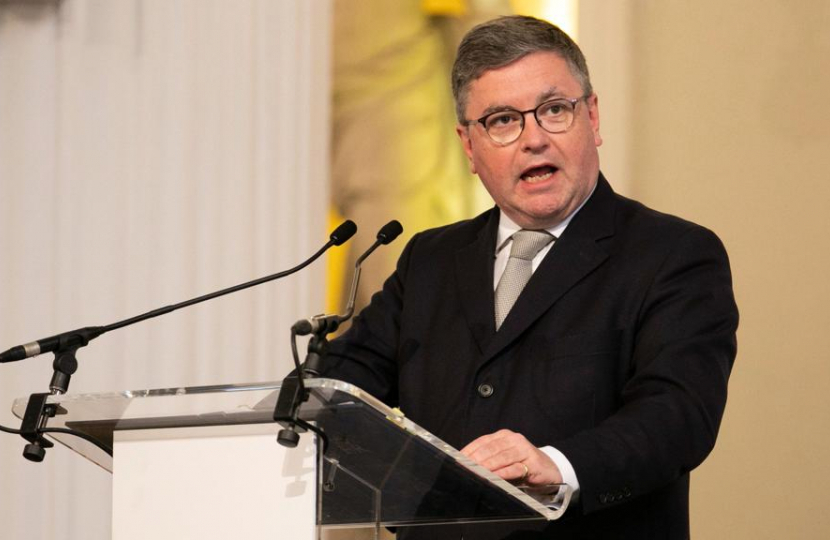
FOR PROBLEMS, READ OPPORTUNITIES
By Rt Hon Sir Robert Buckland KBE KC MP
Speech delivered at the Royal Society, 1st Nov 2022
It has become a trend, almost a fashion, for politicians and commentators to observe the current national and international situation and draw an overwhelmingly negative conclusion. A recession in the US and in Europe is highly likely, we are told. The war in Ukraine continues on its bloody course. As the world continues to develop at a blistering rate, finite energy, food and economic resources are being bought up by new powers, meaning that cost trends for commodities that we have become casually used to will continue to rise. We in the West can no longer make cosy assumptions about the developing world and our relationship with it. The recent upheaval in Government here in the UK presents us, many claim, with a salutary lesson in the dangers of hope outpacing realism. In the words of the oleaginous editor Mr Salter to his newspaper boss in Scoop, “Up to a point, Lord Copper”. Fewer and fewer people are living in absolute poverty, which is good news, but conversely, the democractic deficit is rising across the world.
Amidst all of this is the challenge of energy supply. As opposed to it being an insurmountable problem, the question of energy security should be viewed as an exciting opportunity. The rise of electricity generation from renewable sources has been significant-from well under 10% in 2010 to over 40% now, for example. All this has been driven by a mix of private investment and some government incentives, albeit with mixed results. It is my belief that whilst Government intervention on prices has helped to increase certainty for potential investors, the energy market itself was ripe for just the sort of overhaul we are now starting to see. Putin’s war has accelerated a process that needed to happen, including the decoupling of the cost of electricity from the price of gas. We now have the chance to develop real and lasting energy security, which has to include nuclear power. Government legislation to change the way in which nuclear investments can be funded, plus the creation of the new Great British Nuclear body, all point to a renewed sense of urgency when it comes to the need to renew our energy baseload.
Internationally, Putin’s invasion of Ukraine, the event which brought the importance of energy security back into the minds of both the public and policy makers, alos provides Western governments with an opportunity to reset relations with nations across Africa.
Before I briefly outline how I believe the West can reset relations, it is important to acknowledge our own previous failings. Over the last decade, western influence in Africa has waned. To many African elites, democracy no longer seems the most desirable form of government and western military assistance in tackling security concerns like the rise of Islamic fundamentalism appears to provide a useful scapegoat for domestic failures. Nothing illustrated this loss of influence more vividly than the UN vote on condemning Russia’s actions. Moscow and Beijing have successfully filled the geopolitical vacuum the West has created over the last decade, but with sensible policies and dialogue the UK, US and European allies can reassert our influence in a way that is both beneficial for Western interests and, crucially, for nations across Africa.
A central pillar of Russian and Chinese geopolitical engagement with African states is tapping into their perceptions of western hypocrisy in our foreign policy. Western governments, so their narrative goes, never practice what they preach. Concern for security and human rights only extends to areas where it is in their own interests and the interventions in Iraq and Afghanistan were nothing more than neo-colonial wars.
As obviously flawed as these amendents are, we must acknowledge they are powerful because in some instances they are grounded in truth. In the past, we have fallen short of the values we champion, but it is the strength of our democratic system that we are able to admit error and rectify mistakes. There is encouraging evidence that the Government is aware of this. The appointment of my colleague Andrew Mitchell signifies a renewed commitment to international development, a policy area that after the current economic instability the UK can once again emerge as a world leader.
On a recent charm offensive across Africa, the Russian Foreign Minister Sergei Lavrov declared that Russia “does not impose anything on anyone or tell others how to live”. Beijing and Moscow offer infrastructure investment, security and sizable loans regardless of a government’s human rights record or strength of democratic institutions.
Mr Lavrov’s analysis is, of course, full of lies and contradictions, but it illustrates a perception felt across Africa that when it comes to western states, investment or support always comes with strings attached, and that Western governments always talk down to their poorer counterparts. In my view, Western governments should seek to consult and not to condescend. This does mean that we sideline our own values for geopolitical gain but dealing with the situation as it is rather than how we would like it to be. The Biden administration’s “Build Back Better World” and the EU’s “Global Gateway” offer examples of potentially positive engagement; rather than having to make a binary choice between Sino Russian projects and western investment, African states can choose the West on merit rather than as a result of pressure.
When it comes to Russia, its own colonial history plus Putin’s clear wish to emluate Catherine the Great and Potemkin are clear examples of their true nature. Putin has had the coffin of Potemkin in Kherson removed to Moscow, where he will be hailed as a hero and conqueror by his self-styled successor. Russia’s own record in taking in refugees from previous crises is lamentable: just 828 Syrian refugees as opposed to Germany’s millions. We are in a much stronger position that we sometimes realise.
Back at home, when it came to the Covid crisis, the Government did not hesitate from underwriting investment by private enterprise into vaccine manufacturing capacity, which undoubtedly has made us stronger and more resilient in the face of future health emergencies and supply pressures. This was reshoring in a big way, which only came about as a result of the imperatives that Covid created. We are of course fortunate to have a world-leading research base, but
When it comes to automation and digitalisation, we musn’t appear to be like the proverbial rabbit in the headlights. There is no doubt that the nature of work will change, and the pace of that change will for many be more than evolutionary. Yet it is my belief that artificial or machine intelligence will open up new avenues of work that thus far have been logistically impossible to undertake. Whether it is the clinical procedure that up until now has been too risky to undertake, or the legal case that in the past would have required years of research and evidence-gathering, AI can be our friend and our servant. The real challenge posed by this technology is not in terms of the work it can generate, but the way in which it can affect the our fundamental ethics. I think it is right to view AI not through the prism of a particular job or profession, but through the lens of concepts and principles. For example, justice, medical ethics and financial probity. We must ensure that there is a rules-based system for using AI that is truly international, that is comprehensive enough without being so general that it becomes meaningless and which is as future-proofed as possible. When AI algorithms are already taking the place of human judges in millions of consumer and civil cases in China, for example, then we must all act to ensure that the very concept of justice itself is not changed or reduced before our eyes. I am not against the use of AI in dispute resolution; anyone who has used the e-bay process will have relied upon this technology, but what is vital is the question of informed consent. It is one thing for a company or private enterprise to use non-human means to resolve disputes, but it is quite another for a nation state to move its judicial system in the direction of AI without knowledge, consent and the ultimate human element that is so often the essence of justice in each case.
Britain’s leading role in research and technology, plus its soft power leadership and its deep reservoir of knowledge and expertise makes us well-placed to engage with other nations and regions with honesty, humility and in a spirit of genuine mutuality that will serve to make our future a bright one and for us to turn the problems of today into the opportunities of tomorrow.




